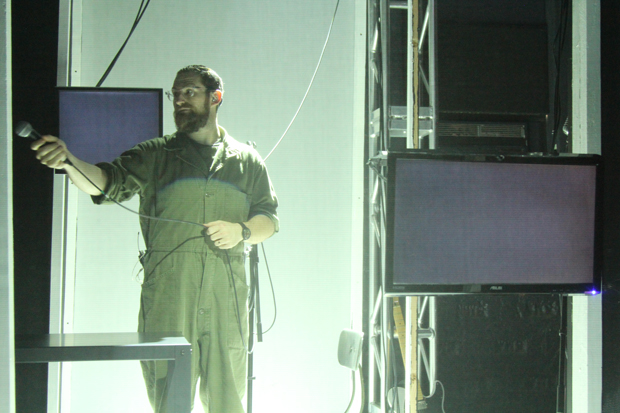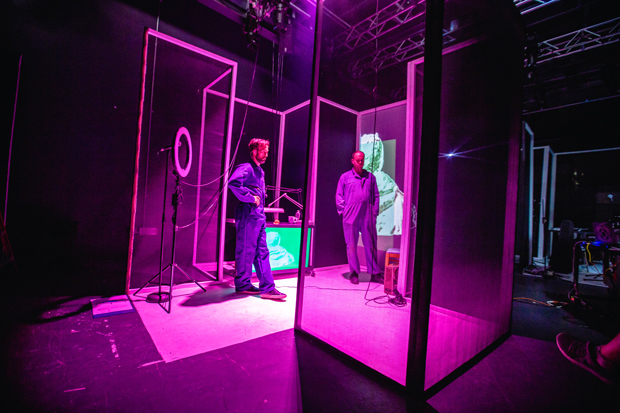Remnant Explores War, Death, and All That's Left Behind
Theater Mitu’s latest experimental work embraces theater, music, and installation art to dizzyingly philosophical ends.

(© Theater Mitu)
The grand ambitions of Theater Mitu's new work, Remnant, are explicated both in the program note offered by director (and Theater Mitu founding artistic director) Rubén Polendo — in which a quote from The Mahabharata leads to a philosophical rumination on the physical and emotional scars left behind by war and death — and in an introductory projection on a wall in the lobby of the company's new Mitu580 performance space in Gowanus, Brooklyn, part of which reads, "You are invited to view these performance portraits [emphasis theirs] as a disorienting mix of remains. Some lost of time; some lost to sense; none of them lost to us, the living."
"Disorienting" is certainly one way to describe the set design of the Mitu580 performance space for Remnant: divided up into three sections, with three groups of performers enclosed in a box within each section performing three different plays-within-the-play simultaneously. All audience members don headphones to focus on the drama unfolding right in front of them, but you can still occasionally hear snippets of the other dramas, and the attendant audience reactions, surrounding them. Your curiosity about what's happening in the other boxes will eventually be satisfied, though: Once each roughly 25-minute playlet is finished, audience members are instructed to move over to a different section to experience what's happening there. (For the performers, that means each group performs the same mini-drama three times over the course of an 80-minute show.)

(© Theater Mitu)
Each playlet tackles a different aspect of the wartime experience, both in the field and back at home. Box A, featuring Michael Littig and Corey Sullivan, centers on the experience of war veterans, many of them either retelling combat stories or describing their PTSD traumas, with an illuminating primer on the various names post-traumatic stress disorder has taken over the past century. Box C looks at war trauma from the perspectives of a doctor (Justin Nestor) and a journalist (Attilio Rigotti), both of whom approach death and dying from an emotional distance. The strangest mini-drama, however, is enacted in Box B, which takes the form of a live radio variety show featuring announcer Denis Butkus, musicians Kayla Asbell and Xiao Quan, and sound designer Alex Hawthorn performing original songs (by Ada Westfall, who also provides voiceovers elsewhere), reenacting an episode from an Arthurian legend, and reciting a passage from The Mahabharata, among other things, all offering cultural and philosophical perspectives on war, death, and loss. Hawthorn's electronics-based sound design and the lighting design devised by Hawthorn, Polendo, Rigotti, and associate director Scott Spahr couch all of this in an environment that is both soothingly contemplative and eerily discomfiting.
The raw material for Remnant was culled in large part from hours of interviews, conducted by Theater Mitu members, with soldiers and civilians, ranging from current and past members of military forces and their family members; doctors; nurses; police officers; academics; and artists. The program even includes a five-page "research bibliography" that offers an indication of the depth of preparation that went into conceiving the show. Such an excess of research is fully in keeping with the resulting piece, which is interested in not just exploring its themes but surrounding us in them. To that end, Polendo and company, as has been the case with many of their previous productions (most notably the 2014 piece Juárez: A Documentary Mythology), explodes theatrical conventions by blurring the lines of documentary and fiction, and embracing video and installation art, to capture as much of their chosen subject as is humanly possible.
Perhaps Remnant tries to tackle too much. Considering its philosophical aspirations, this work should be thought-provoking. Instead, the sheer sensory overload of its multidisciplinary approach to some degree becomes self-defeating, as one is bound to come away appreciating the ceaselessly inventive stagecraft more than meditating on the themes it presents. And yet, there are so many striking bits of stagecraft to take in: ghostly video special effects, immersive spatial sound effects, Kate Bush's song "Army Dreamers" reinterpreted as a funeral dirge. Remnant is the kind of admirably overreaching failure that is willing to risk disaster for the sake of testing theatrical boundaries in order to push us out of our aesthetic and intellectual comfort zones. You may come away exhilarated, disappointed, or both, but you will surely not be left indifferent.

(© Theater Mitu)






![0928 Cleveland MatteoLane 2024 1200x1200[98] copy](https://www.theatermania.com/wp-content/uploads/sites/4/2024/10/0928_Cleveland_MatteoLane_2024_1200x120098-copy.jpeg?w=300)



